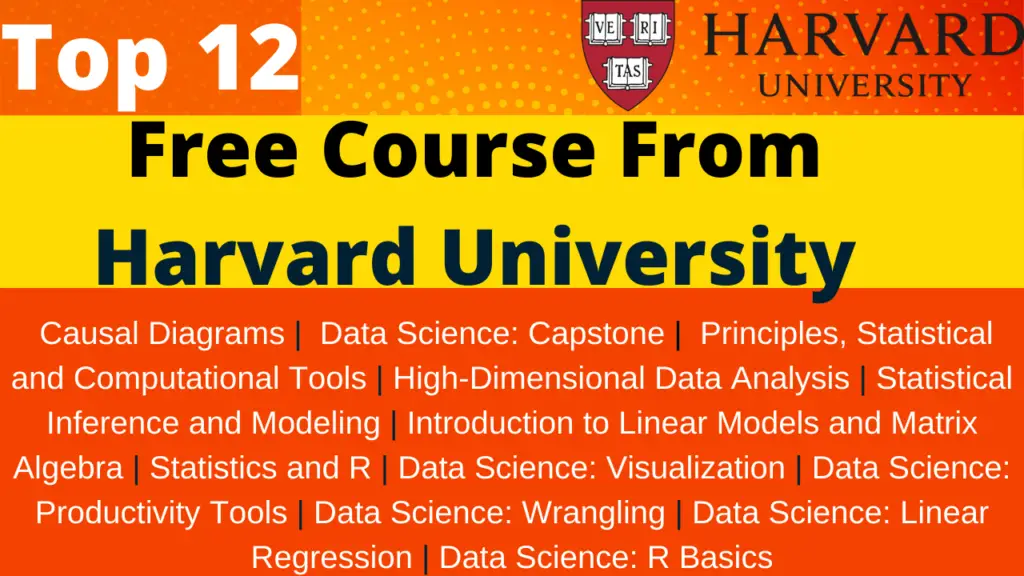In this post I will talk about 12 Top Free Course On Data Science By Harvard University.
Harvard University is dedicated to greatness in instructing, learning, and research, and to creating pioneers in numerous controls who have any kind of effect worldwide.

1- Causal Diagrams: Draw Your Assumptions Before Your Conclusions
Learn basic graphical guidelines that permit you to utilize natural pictures to improve study plan and information examination for causal deduction.
What you’ll learn
- Step by step instructions to make an interpretation of master information into a causal graph
- The most effective method to draw causal graphs under various presumptions
- Utilizing causal outlines to distinguish basic predispositions
- Utilizing causal graphs to control information examination
This course Shows what you’ve gained from the Professional Certificate Program in Data Science.
What you’ll learn
- The most effective method to apply the information base and abilities learned all through the arrangement to a certifiable issue
- Autonomously deal with an information investigation venture
3- Principles, Statistical and Computational Tools for Reproducible Data Science
Learn abilities and devices that help information science and reproducible examination, to guarantee you can believe your own exploration results, repeat them yourself, and convey them to other people.
What you’ll learn
- Essentials of reproducible science utilizing contextual investigations that outline different practices.
- Key components for guaranteeing information provenance and reproducible test plan.
- Factual techniques for reproducible information investigation
4- High-Dimensional Data Analysis
An attention on a few procedures that are broadly utilized in the investigation of high-dimensional information.
What you’ll learn
- Numerical Distance
- Measurement Reduction
- Solitary Value Decomposition and Principal Component Analysis
- Different Dimensional Scaling Plots
- Factor Analysis
- Managing Batch Effects
5- Statistical Inference and Modeling for High-throughput Experiments
An attention on the methods normally used to perform factual induction on high throughput information.
What you’ll learn
- Sorting out high throughput information
- Various correlation issue
- Family Wide Error Rates
- Bogus Discovery Rate
- Blunder Rate Control strategies
- Bonferroni Correction
6- Introduction to Linear Models and Matrix Algebra
Figure out how to utilize R programming to apply straight models to examine information in life sciences.
What you’ll learn
- Grid polynomial math documentation
- Grid polynomial math activities
- Use of lattice variable based math to information examination
- Straight models
- Brief prologue to the QR decay
A prologue to fundamental factual ideas and R programming abilities important for breaking down information in the existence sciences.
What you’ll learn
- Irregular factors
- Conveyances
- Deduction: p-qualities and certainty stretches
- Exploratory Data Analysis
- Non-parametric insights
8- Data Science: Visualization
Learn essential information representation standards and how to apply them utilizing ggplot2.
What you’ll learn
- Information representation standards
- The most effective method to convey information driven discoveries
- Step by step instructions to utilize ggplot2 to make custom plots
- The shortcomings of a few generally utilized plots and why you ought to keep away from them
9- Data Science: Productivity Tools
Keep your undertakings coordinated and produce reproducible reports utilizing GitHub, git, Unix/Linux, and RStudio.
What you’ll learn
- Instructions to utilize Unix/Linux to deal with your record framework
- Step by step instructions to perform rendition control with git
- Instructions to begin an archive on GitHub
- Instructions to use the numerous valuable highlights gave by RStudio
Figure out how to measure and change over crude information into designs required for investigation.
What you’ll learn
- Bringing information into R from various record designs
- Web scratching
- Step by step instructions to clean information utilizing the tidyverse to all the more likely encourage examination
- String handling with normal articulations (regex)
- Fighting information utilizing dplyr
11- Data Science: Linear Regression
Figure out how to utilize R to actualize direct relapse, one of the most well-known measurable demonstrating approaches in information science.
What you’ll learn
- How straight relapse was initially evolved by Galton
- What is perplexing and how to identify it
- Instructions to analyze the connections between factors by executing straight relapse in R
Assemble an establishment in R and figure out how to fight, investigate, and envision information.
What you’ll learn
- Essential R punctuation
- Central R programming ideas, for example, information types, vectors number-crunching, and ordering
- Step by step instructions to perform activities in R including arranging, information fighting utilizing dplyr, and making plots
